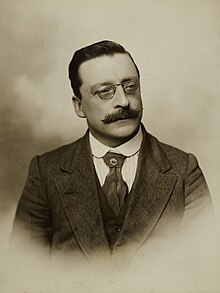
Back Arthur Griffith Afrikaans آرثر غريفيث Arabic آرثر جريفيث ARZ Artur Qriffit Azerbaijani Arthur Griffith Breton Arthur Griffith Catalan Arthur Griffith Welsh Arthur Griffith German Arthur Griffith Esperanto Arthur Griffith Spanish
Arthur Griffith | |
|---|---|
 | |
| President of Dáil Éireann | |
| In office 10 January 1922 – 12 August 1922 | |
| Preceded by | Éamon de Valera |
| Succeeded by | W. T. Cosgrave |
| Minister for Foreign Affairs | |
| In office 26 July 1922 – 12 August 1922 | |
| President | Michael Collins |
| Preceded by | George Gavan Duffy |
| Succeeded by | Michael Hayes |
| In office 26 August 1921 – 9 January 1922 | |
| President | Éamon de Valera |
| Preceded by | George Noble Plunkett |
| Succeeded by | George Gavan Duffy |
| Minister for Home Affairs | |
| In office 2 April 1919 – 12 August 1921 | |
| President | Éamon de Valera |
| Preceded by | Michael Collins |
| Succeeded by | Austin Stack |
| Deputy leader of Sinn Féin | |
| In office 6 June 1917 – 9 January 1922 | |
| Leader | Éamon de Valera |
| Preceded by | Thomas Kelly |
| Succeeded by | Kathleen Lynn |
| In office 20 May 1905 – 11 January 1911 | |
| Leader | Edward Martyn |
| Preceded by | New office |
| Succeeded by | Jennie Wyse Power |
| Leader of Sinn Féin | |
| In office 11 January 1911 – 6 June 1917 | |
| Deputy | Jennie Wyse Power Thomas Kelly |
| Preceded by | John Sweetman |
| Succeeded by | Éamon de Valera |
| Teachta Dála | |
| In office May 1921 – 12 August 1922 | |
| Constituency | Cavan |
| In office June 1918 – May 1921 | |
| Constituency | Cavan East |
| Member of Parliament | |
| In office 14 December 1918 – 12 August 1922 | |
| Preceded by | New office |
| Succeeded by | Vacant, then constituency abolished |
| Constituency | Tyrone North West |
| In office 20 June 1918 – 12 August 1922 | |
| Preceded by | Samuel Young |
| Succeeded by | Vacant, then constituency abolished |
| Constituency | Cavan East |
| Member of the Northern Ireland Parliament | |
| In office 24 May 1921 – 12 August 1922 | |
| Preceded by | New office |
| Succeeded by | Edward Archdale |
| Constituency | Fermanagh and Tyrone |
| Personal details | |
| Born | 31 March 1871 Dublin, Ireland |
| Died | 12 August 1922 (aged 51) Dublin, Ireland |
| Cause of death | Intracerebral hemorrhage and heart failure |
| Resting place | Glasnevin Cemetery, Dublin, Ireland |
| Political party | Sinn Féin |
| Spouse |
Maud Sheehan (m. 1910) |
| Children | 2 |
Arthur Joseph Griffith (Irish: Art Seosamh Ó Gríobhtha; 31 March 1871 – 12 August 1922) was an Irish writer, newspaper editor and politician who founded the political party Sinn Féin. He led the Irish delegation at the negotiations that produced the 1921 Anglo-Irish Treaty, and served as the president of Dáil Éireann from January 1922 until his death later in August.
After a short spell in South Africa, Griffith founded and edited the Irish nationalist newspaper The United Irishman in 1899. In 1904, he wrote The Resurrection of Hungary: A Parallel for Ireland, which advocated the withdrawal of Irish members from the Parliament of the United Kingdom and the setting up of the institutions of government at home in Ireland, a policy that became known as Sinn Féin (ourselves). On 28 November 1905, he presented "The Sinn Féin Policy" at the first annual convention of his organisation, the National Council; the occasion is marked as the founding date of the Sinn Féin party. Griffith took over as president of Sinn Féin in 1911, but at that time the organisation was still small.
Griffith was arrested following the Easter Rising of 1916, despite not having taken any part in it. On his release, he worked to build up Sinn Féin, which won a string of by-election victories. At the party's Ardfheis (annual convention) in October 1917, Sinn Féin became an unambiguously republican party, and Griffith resigned the presidency in favour of the 1916 leader Éamon de Valera, becoming vice-president instead. Griffith was elected as an MP for East Cavan in a by-election in June 1918, and re-elected in the 1918 general election, when Sinn Féin won a huge electoral victory over the Irish Parliamentary Party and, refusing to take their seats at Westminster, set up their own constituent assembly, Dáil Éireann.[1]
In the Dáil, Griffith served as Minister for Home Affairs from 1919 to 1921, and Minister for Foreign Affairs from 1921 to 1922. In September 1921, he was appointed chairman of the Irish delegation to negotiate a treaty with the British government. After months of negotiations, he and the other four delegates signed the Anglo-Irish Treaty, which created the Irish Free State, but not as a republic. This led to a split in the Dáil. After the Treaty was narrowly approved by the Dáil, de Valera resigned as president and Griffith was elected in his place. The split led to the Irish Civil War. Griffith died suddenly in August 1922, two months after the outbreak of that war.
- ^ "Arthur Griffith". Oireachtas Members Database. Archived from the original on 19 July 2019. Retrieved 19 July 2019.